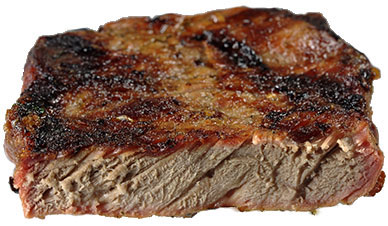How Cooking Affects Food
National Cancer Institute |
Cooking has always been considered generally safe, as well as important when it comes to killing pathogens. From a raw food diet perspective, the cooking process damages food, and can create toxins as a by-product of some cooking methods.
We have all heard that cooking can destroy "some" nutrients from our food, but there has never been a clear understanding of "how much" is destroyed and from "which foods." We do know that cooking renders food nutritionally deficient, and that some methods of high temperature cooking produce by-products that are recognized carcinogens (contributors to cancer).
High temperature cooking & cancer...
 There is a considerable amount of evidence showing that certain methods of cooking do indeed produce toxic by-products (especially meat and animal protein cooked at high temperatures), and that there is a correlation between the method of cooking and the length of time food is cooked, and the degree of loss or damage to nutrients.
There is a considerable amount of evidence showing that certain methods of cooking do indeed produce toxic by-products (especially meat and animal protein cooked at high temperatures), and that there is a correlation between the method of cooking and the length of time food is cooked, and the degree of loss or damage to nutrients.
Let's take a look at how cooking affects the food we eat:
Cooking Removes Water
Second to oxygen, water is the greatest nutrient our body needs. Cooking and food preparation methods can significantly reduce the water content in food. The average American walks around in a mild state of dehydration from a lack of drink water, and from eating foods that are high in water content (namely most fruits and vegetables)
Eating a fresh apple is not the same as eating dehydrated apple slices, as dehydration can oxidize the nutrients in food and reduce its nutrient value.
Cooking Reduces Nutrients & Beneficial Bacteria
Cooking reduce and destroys certain nutrients and important phytochemicals in food. Many vitamins are heat-sensitive, especially antioxidants such as vitamin C. 20-60% of vitamin C is lost during cooking. Commercially processed food loses more nutrient value - 50-80%. Steaming retains more nutrients, with the loss under 30%.
After destroying the nutrients during food processing and refining, food manufacturers then try to replace the nutrients by "enriching" or "fortifying" the food with synthetic versions of natural vitamins. The body absolutely recognizes these as artificial, and treats them as such.
When food is cooked, minerals are leached out, evaporated, or chemically altered (especially when foods are boiled). Even though minerals can survive higher cooking temperatures, approximately 30-40% of minerals are leached out of foods and into cooking water, which is usually discarded. Minerals are essential to all metabolic activities and their presence is required to sustain the alkalinity of the bodily fluids (see the acid/alkaline Balance section). They are also required for cellular healing and repair.
Raw foods include bacteria and other microorganisms that help populate the digestive tract with beneficial gut flora. These beneficial bacteria are generally killed by cooking.
Cooking Food Increases White Blood Cell Production
Dr. Kouchakoff, |
A diet of predominantly cooked foods has been shown to cause degenerative changes in our blood chemistry, changes that usually reverse rapidly once raw foods are incorporated as a staple in our diet.
White blood cell production increases when we eat cooked food. These blood cells are the "good guys" that are released into our immune system to neutralized toxins. The body increases the production of white blood cells in response to eating cooked food, i.e. an immune response. As food cooked at high temperatures causes the formation of cancer-causing compounds, this is not surprising.
Russian scientist Dr. Kouchakoff found that when cooked foods are eaten, a large amount of white blood cells appear in the bloodstream exceeding 2-4 times the normal amount. Cooked food sets up a bodily response to fight the "foreign invaders" produced by the cooking process. Studies have also shown that our immune system reacts to the introduction of cooked food to the bloodstream the same way it does to foreign pathogens such as bacteria, viruses, and fungi: The body releases an army of white blood cells. This reaction does not occur with raw foods unless contamination is present.
Learn more about why microwaving food is especially damaging, not only to nutrients in food, but also to our blood and bodily systems after we eat them.
Microwaves - why you should ditch them...
Cooking Degrades Fiber
When cooked, the fiber in food changes in structure and is less able to stimulate peristalsis in the intestinal tract walls (wave-like muscular movements that push food along) as it does when present in raw foods.
Cooking Damages Food Enzymes
Enzymes are critical to all living functions because they are needed for every chemical reaction that occurs in the body, including our digestion and metabolism. They are present both within our bodies, and in the raw foods we eat. Enzymes begin to deteriorate at 118° and are completely destroyed at 160°.
Learn about the all-important enzymes...
High Temp Cooking Creates Cancer-Causing Chemicals
Many high temperature cooking methods (roasting, frying, broiling, barbecuing to char, etc.) cause protein and fats to produce carcinogenic substances, including acrolein, hydrocarbons, nitrosamines, and benzopyrene (a potent carcinogen).
| High Temperature Cooking & Cancer
The National Academy of Science's book "Diet, Nutrition & Cancer" is a thorough review of scientific evidence to provide the most authoritative assessment yet of the relationship between dietary and nutritional factors and the incidences of cancer. The book cites many researchers who concluded that
cooking quickly creates mutagens and carcinogens in food |
Let's take a look at some of the chemical by-products of high temperature cooking:



